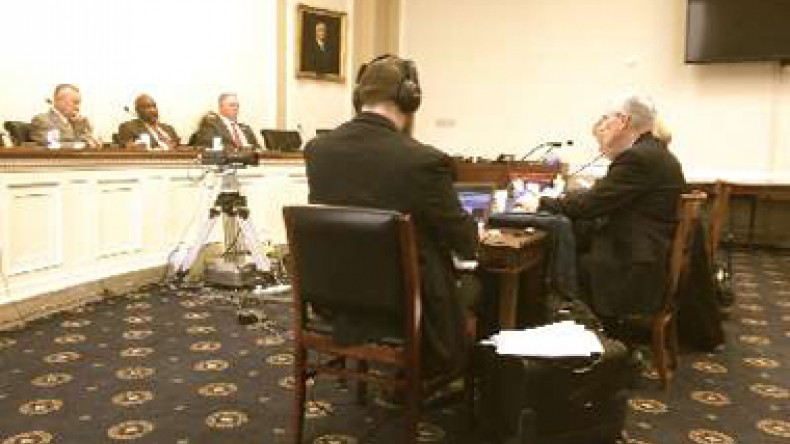
Hearings in Washington on Azerbaijan: Crackdowns only make ‘Baku Maydan’ more real
During the hearings on the situation of Azerbaijan at the Committee on International Relations of House of Representatives official Baku was once more criticized for the crackdowns on free media and civil society, information agency “Turan” reports.
“Azerbaijan’s location in a difficult neighbourhood and being ‘sandwiched’ by Russia and Iran shouldn’t be an excuse for ignoring right volitions,” Dana Rohrabacher, the Chairman of House Foreign Affairs Subcommittee on Europe and Eurasia, said.
Touching upon the US interests in Azerbaijan, he noted that “the seizure of the RFR/RL office in Baku is unacceptable, as well as the journalists’ arrests. Taking up this kind of measures the authorities in Azerbaijan are limiting press freedom and public discussions.”
The Azerbaijani ambassador and other officials didn’t attend the hearings, while the Embassy employees and pro-government media were present and were putting down everything that was going on.
William Keating, the Congressman from Massachusetts, also condemned the arrests of the journalists in Baku and the inadmissibility of the anti-American campaign. According to the congressman, this is bringing about serious questions and concern over the plans and intentions of the authorities in Azerbaijan. That’s why Obama Administration should “clearly prioritize those concerns while their communication with the Aliyev government,” he added.
Kennan Institute fellow Audrey Altstadt noted that the United States and its representatives must be unapologetic about the human rights and democracy violations and provide more support for the pro-democracy movements and groups in Azerbaijan. “Critics of the regime are harassed or go to jail. The trend accelerated in 2014. There are about 100 political prisoners in Azerbaijani jails including human rights defenders, journalists and lawyers. This is extremely counter-productive and risky,” she said.
She also reminded that all of these processes increased the 2003 accession to the presidency of Ilham Aliyev. However, since his third presidency term started in 2013 the instances of such repressions have increased in number. Recently the authorities in Azerbaijan have taken up an onrush against the US with and unprecedented anti-American rhetoric. “It’s enough to remind the president’s chief of staff Ramiz Mehdiyev’s article accusing the US of trying to “destabilize” the Aliyev government and the situation in Azerbaijan,” Altstadt mentioned.
In his turn, former US Ambassador to Baku Richard Kauzlarich noted that Ramiz Mehdiyev’s activities destroyed an almost two decade long effort by both the United States and Azerbaijan to improve relations. Many observers have noticed the negative tendencies towards the US and the Americans since the presidential elections in 2013. The US and Azerbaijan are in a different place than just five years ago. The geopolitical and global energy pictures have seen substantial changes. “For that reason the role and significance of Azerbaijan and the Caspian region are less critical to US energy security needs,” Kauzlarich highlighted.
“Currently, Azerbaijan is experiencing the worst times ever. If there is no progress toward release of all political prisoners then the US Government should consider imposing sanctions on those officials responsible for these arrests and continued persecutions of NGOs, activists and journalists,” Kauzlarich stressed.
While discussing Baku foreign policy issues, the participants were pointing out that several members of the Azerbaijani ruling elite sought a rapprochement with Russia in foreign policy issues and criticize America accusing it of their internal problems. However, the historical examples confirm that the authorities’ attempts to limit and press on the civil society instead of discussing and solving the citizens’ problems only radicalize people. The police crackdowns only increase the radical attitudes and make ‘Baku Maydan’ more real, which the authorities are so keen to avoid.
Expert from Johns Hopkins University Svante Cornell considers that a decade ago Baku was more responsive to U.S. criticism.
In his turn, during an interview given to “Turan,” Richard Kauzlarich said that completely unreasonably Baku has created problems for itself out of nothing, especially in recent months. Commenting on the Azerbaijani government’s main ideologist Ali Hasanov’s yesterday’s statement about the absence of problems between Baku and Washington, Kauzlarich noted that he is always holding a close watch over Hasanov’s statements.
“I would advise him to read more, especially the article of his boss Ramiz Mehdiyev. Never during my term in Baku and after my return from there had there been a case that a senior Azerbaijani official attack the US so defiantly and so publicly, accusing us of preparing a color revolution and creating a Fifth Column,” Kauzlarich stressed.
“Turan” also notes that Christopher Smith, chairman of Helsinky Commission, called on the authorities in Azerbaijan to allow the human rights defender Emin Huseynov, who had escaped criminal prosecution in the Swiss Embassy, leave the country.
“Being the head of the Institute for Reporters’ Freedom and Safety (IRFS), Emin Huseynov has worked tirelessly to defend journalists and promote media freedom in Azerbaijan. I appeal to President Aliyev to immediately allow Mr. Huseynov to leave the Swiss Embassy and give him safe passage out of Azerbaijan. Sadly, the persecution of Mr. Huseynov is part of a larger crackdown on human rights activists,” Smith stated.
Newsfeed
Videos






























